#accepted: claudius
Text





Of course. Who else should share it with me but my father's beloved brother? Uncle, I appoint you my colleague as Consul for the first term.
#i claudius#caligula#claudius#john hurt#drek jacobi#love the way Claudius looks around for the “real” consul#and how ready is lentulus to grovel and accept a child a s a consul#but idiot uncle claudius is too much for him
12 notes
·
View notes
Text
hamlet through the lens of consequences to actions and if those actions are justifiable and whether hamlet knows he is doomed by the consequences of his actions is so important to me
#because. like.#that’s the climax!#Laertes fought hamlet bc hamlet killed his father and by association his sister!#yes Claudius manipulated his grief#that’s a very important point#and yes Laertes turns against Claudius and forgives hamlet#but it’s still important!#it shows that our shitty decisions can bite us in the ass!#is it all hamlet’s fault? no#but a lot of it unfortunately is#he just can’t see that he’s making these life changing decisions because he’s so wrapped up in his grief and existential dread#and then he just accepts it in the end.#he doesn’t fully realize it but he accepts it#hamlet#hamlet prince of denmark#shakespeare#classic lit
11 notes
·
View notes
Text
I nearly just called Hamlet’s act 4 scene 4 soliloquy his “anti-Claudius manifesto” in my English essay. I kind of want to leave it in there lmao
#hamlet#shakespeare#anti-claudius manifesto should be accepted into the academic world as the official name for this soliloquy.
17 notes
·
View notes
Text
i feel like i’m going to shit myself over the hamlet casting we just did and it’s definitely because we cast a man as gertrude and the last vestiges of my internalized transphobia that i didn’t realize i still have is tearing my confidence to shreds
#we’re still playing her as a woman. to clarify#genuinely need reassurance on this one folks my brain is going You Fucked Up You Fucked Up You Fucked Up#it was the right choice his dynamic with our claudius choice was fantastic and they both play into the themes we need from their characters#- for our concept but.#idk i’ve never had so many eyes that matter on a show i’m doing the stakes feel so high and i feel like i did something wrong.#and i do not feel this way about casting a woman as claudius!! or any of the other roles whose actors don’t match their characters gender!!!#i also think it’s a little bit bc of the specific actor but like. i know he’s comfortable playing feminine roles but there’s a difference#between drag and playing Gertrude (which should Not feel like that) and i’m also feel weirdly like we took advantage of him being willing to#- play this kind of role? which is such bullshit and makes no sense but it is after all the anxiety talking#anyway. he accepted! so like. i don’t know why i feel this way#if he was uncomfortable with it he wouldn’t have accepted the callback#ted talks#um. vent fr
4 notes
·
View notes
Text
NERO CLAUDIUS FROM FATE/EXTRA HAS WOKEN UP IN THE DOME.
we're so happy to have you here! ... enjoy your stay.
What about you? Are you going to join them in The Dome too?
How about taking a trip to the VISITOR CENTER today and check out our HISTORY and LAWS. Maybe we can entice you to join our RESIDENTS too...
We'll see you in THE DOME...
#discord rp#multifandom rp#city rp#canon rp#accepted#video game rp#fate rp#fate extra#fate extra rp#nero claudius
0 notes
Text
Writing Notes: Conflict
Conflict - a struggle between two opposing forces
Key Character Terms
1. Protagonist
The main character in a literary work
Usually seen as good, upright, respectable, and always attempting to take the proper course of action
Is not always good
For example, in Wuthering Heights, Heathcliff, a brooding and vengeful man, is the protagonist
Thus, the protagonist is a central character, regardless of whether he or she is good or bad
Note: Some literary works may involve an animal protagonist, such as Buck in Call of the Wild, or the animal characters in folk tales or fables.
2. Anti-Hero
When the protagonist is flawed or dominated by negative traits or questionable behavior, he or she is called an "anti-hero"
The term "anti-hero" does not, however, mean that the central character stands in opposition to an actual hero in the story or novel
Rather, it means that the central character stands in opposition to the traditional idea of a hero
3. Antagonist
Stands in opposition to the protagonist
In most novels, the protagonists and antagonists will be clearly distinct and remain consistent
In general, the antagonist will be viewed as bad, wicked, or malicious
Even if dominated by negative traits, however, the antagonist can be just as significant and complex a character as the protagonist
4 Major Types of Conflict
By observing the manner in which a character resolves or doesn’t resolve a conflict, one can gain insight into the character’s qualities, values, and personality.
1. Character’s struggle against nature
When a character must overcome some natural obstacle or condition, a conflict with nature occurs
For example, the men in "The Open Boat" must strive to reach land or perish at sea
Floods, snowstorms, insects, and animals may all constitute a conflict with nature
There are, however, less obvious manifestations of nature that can also constitute a conflict, such as plague or famine
2. Character’s struggle against an antagonist
A struggle between two people is a common element in many works of literature
For example, in Hamlet, Hamlet is involved in a conflict with his uncle, King Claudius, who seeks to have Hamlet killed
However, a conflict between two people is not always openly hostile
For example, in Crime and Punishment, the young murderer Raskolnikov and the police investigator Porfiry engage in a psychological conflict, a battle of wits
3. Character’s struggle against society
A struggle against society occurs when a character is at odds with a particular social force or condition produced by society, such as poverty, political revolution, a social convention, or set of values
For example, in Nicholas Nickleby, the protagonist stands in conflict with a hypocritical education system, while in Bleak House it is a corrupt legal system that functions as the major antagonist
4. Struggle between competing elements within the character (internal conflict)
Within a character, aspects of his or her personality may struggle for dominance
These aspects may be emotional, intellectual, or moral
Examples:
An "emotional" conflict would occur if the protagonist chose an unworthy lover over someone who is devoted
An “intellectual” conflict could entail accepting or rejecting one’s religion
A “moral” conflict might pose a choice between honoring family or country
Such conflicts typically leave the character indecisive and agitated
When such conflicts are resolved, the resolution may be successful or unsuccessful
#writing notes#writeblr#dark academia#spilled ink#studyblr#fiction#conflict#writers on tumblr#writing prompt#poets on tumblr#literature#poetry#creative writing#writing reference#writing resources
49 notes
·
View notes
Text
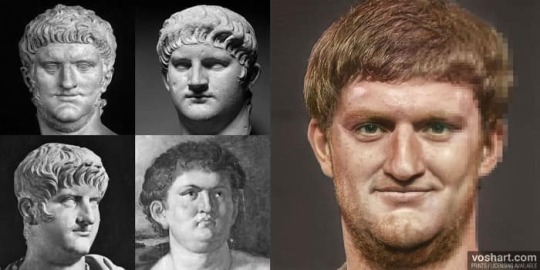
Nero: The end of the Julio-Claudian dynasty (Part I)
He was born on December 15, 37. His birth name was Lucius Domitius Ahenobarbus; When he was adopted by his great-uncle, the Emperor Claudius, his name changed to Nero Claudius Caesar.
Nero was born in the first year of his maternal uncle's reign. His mother, Agrippina, was in her prime, but a year and a half later, accused of treason she was banished. The little boy was left in the care of his paternal aunt Domitia. In the year 40, his father died.
In January 41, his uncle emperor Gaius ('Calígula) was assassinated. His great-uncle Claudius ascended the throne and brought Agrippina back. In 49, when he was 11 years old, his mother married her own uncle Claudius and becoming empress. He was adopted by emperor, and Agrippina appointed as his tutor the famous Hispanic philosopher, orator and politician Seneca.
At the age of 15 he was forced to marry 13-year-old Octavia, daughter of Claudius and Messalina.
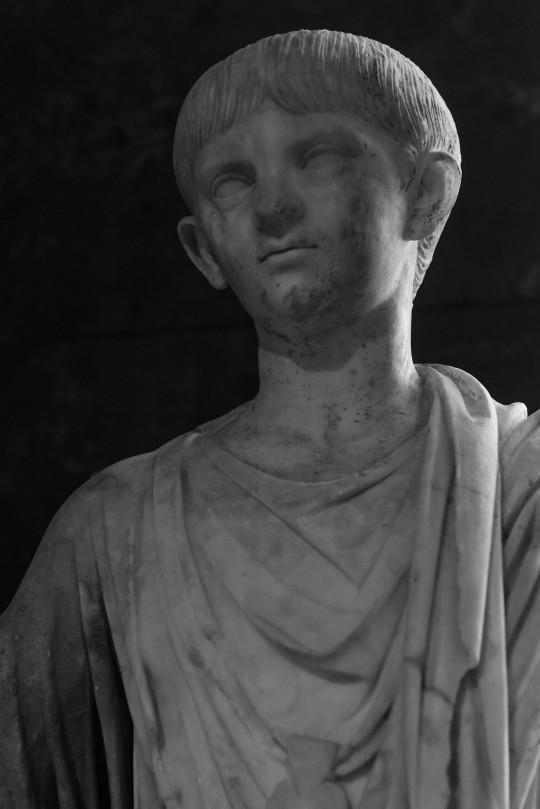
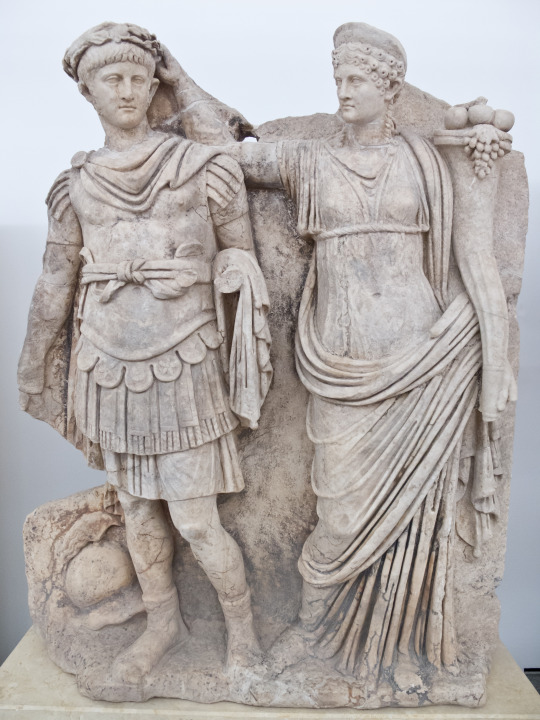
Marble portrait of young Nero, c. 50. Photo by Egisto Sani. Empress Agrippina and young emperor Nero. Photo by Carlos Delgado.
On October 13, 54, 16-year-old Nero became the youngest ruler in Roman history up to that time. Octavia, 14, became the new empress consort. And 25 years after Livia's death, Rome once again has an Empress Mother. The sculpture shows Agrippina crowning him, a clear message that he owes her the throne. This sculpture had hundreds of copies placed throughout the empire.
Something unprecedented happened in Roman coins. Agrippina appears alongside her son on the same side of the coin, as if she were co-ruler, and she was indeed. Those coins, minted at the obvious request of Agrippina, circulated until the year 57. In 58 her image was seen next to Nero with him in front. From the year 59, only the image of Nero would remain.
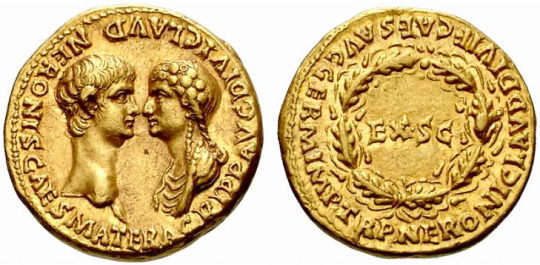
Four months of reign : The first murder?
According to Tacitus, Nero removed Agrippina's favorite freedman from his position as Secretary of the Treasury. Agrippina, feeling outraged, threatened to replace him with Britannicus: "Since Britannicus was the biological son of Emperor Claudius, he was therefore the true heir and would soon come of age (14 years) to rule."
According Suetonius :
"Nero sent for the poisoner Locusta and he forced her to mix as swift and instant a potion as she knew how in his own room before his very eyes. He tried it on a goat but the animal lingered for five hours. Had the mixture steeped again and threw some on a pig.; The beast instantly fell dead. Pleased, Nero ordered that the poison be taken to the dining-room and given to Britannicus. The boy dropped dead ins at the very first taste, and Nero lied; He said that Britannicus was sick and always fell suddenly.
The next day had him hastily and unceremoniously buried in a pouring rain. Nero rewarded Locusta for her eminent services, with large estates in the country."
According all sources: One day before his 14th birthday, on February 11, 55, Britannicus was at a banquet attended by his sister Octavia, Agrippina, Nero, and several important people, and suddenly fell death.
About this matter I must say that those writers contradict themselves since also assure that in the first three years of his reign, Nero lived in acceptable leisure in the palace and obeyed his mother. While Seneca, the prefect Sextus Afranius Burrus and Agrippina were the ones who ruled.
What is the true story? Nero was a young puppet emperor who lived relaxed and obedient to his mother during his first three years, or after four months of reign he was already making decisions and defying his mother? Not to mention the lack of credibility of the story about Nero and Locusta doing experiments with animals and poisons.
It's possible that the boy suffered from epilepsy. And it's possible that so that readers would not doubt that it was a murder, the writers related the death of Britannicus to the conflict between the emperor and his mother; A conflict that actually began three years later according to these same writers, and the coins confirm it.
On the other hand, experts assure that there is no poison ingested orally that instantly kills the victim as Suetonius describes.
The start of the trouble

Portrait of Poppaea Sabina painted by an artist of the Fontainebleau School in 1570. Museum of Art and History, Geneva.
Early year 58. Nero at the age of 20 fell in love with Poppaea Sabina, wife of his friend Marcus Salvius Otho. They began an openly adulterous relationship and rumors of the scandal spread through the city. Agrippina was furious and took Octavia's side, surely not out of affection for her daughter-in-law but because such marriage was a matter of politics and authority. It was at this time that Nero began to become independent from his mother, as well as from Seneca and Burrus, and it was probably in that year that he dismissed Agrippina's favorite freedman.
Nero forced Otho to divorce Poppaea and appointed him governor of Lusitania. At that time this was a "dissembled exile" since Lusitania was the poorest and most boring province in the empire.
The fall and death of Agrippina.
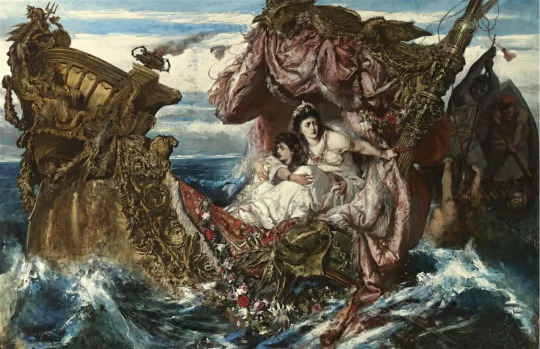
'The Shipwreck of Agrippina' by Gustav Wertheimer. XIX Century
Early 59. Agrippina was forced to retire to live in her villa in Misenum.
Historians claim that one day she and her friend Acerronia set sail with the helmsman Gallus in the Bay of Naples, and on the ship Nero had hidden men who were trying to kill her. They were on deck, under a canopy that had been secretly loaded with lead. At a given signal, the top fell, killing the helmsman and the ship began to sink. Agrippina swam quickly to shore when a man appeared in a boat shouting Agrippina's name; She remained silent but Acerronia shouted: "Here, I am!". The man, hitting her with the oar, killed her, believing she was Agrippina.
Tacitus wrote about it: "Nothing allowed of accidents as the sea." So, it really could have been an accident in which the helmsman and that lady drowned but not Agrippina who swam quickly or could be rescued. If it was an attack, a top-secret plan by Nero, how do they know the details with such precision? Is it possible that the writer, upon hearing the story of Agrippina's accident, created the story of an intricate attack?.
Time later, some guards arrived at the villa of Agrippina with the order to execute her on charges of conspiracy. According to Suetonius: "Agrippina showed them her bare belly and said one of them to stick his sword where her murderer had been conceived."
"After trying to kill his mother three times with poison and discovering that she had become immune thanks to antidotes, he manipulated the ceiling of her bedroom, devising a mechanical device to loosen the panels and let them fall on her while she slept. Agrippina discovered the plan, so Nero devised a folding boat to simulate a shipwreck." -Suetonius
Suetonius writes that Nero sent three men to kill her after learning of the failed attack in the bay. They also claim that this matricide was at the request of Poppaea, who according to them "she was a lady who had everything except decency".
The truth is that on March 23, 59, Agrippina the Younger died at the age of 43 in Misenum, after having lived an intense life of glorious and tragic moments. She died in the same city where, 22 years earlier her hated great-uncle Emperor Tiberius, had died.
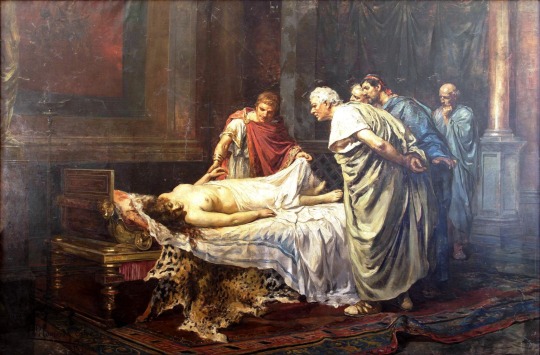
'Nero before the corpse of his mother, Agrippina the Younger ' by Arturo Montero y Calvo, 1887
Sources also claim that Agrippina's corpse was brought before Nero and he only said that his mother looked beautiful even in death.
Regarding this matter, I see three possibilities:
1: Nero fed up with the dominant behavior of her mother or at the simple request of Poppaea, decided to kill her even though she was already far from Rome and therefore could no longer bother them.
2: Agrippina, seeing herself deposed and stripped of her privileged position, simply decided to take her own life in her villa.
3: Furious with her son and for having lost what she had, she was plotting from Misenum, and Nero found out this ordered her execution or banishment. Knowing that she would soon be executed or banished, Agrippina decided it was better to committed suicide. This was a very common attitude in the ancient world.
Except for her sister Drusilla, all her siblings had died at the hands of others. Knowing the mentality of the ancient Romans, undoubtedly Agrippina decided not to suffer the same death as her siblings (if option 3 was what really happened).
But if Agrippina was really murdered, I think she was taken by surprise; While she was sleeping or unsuspecting with her back to the murderer. Resigned and theatrical attitude before the executioners, such as that described by Suetonius, is very un-Roman and very unlikely in the proud Agrippina the Younger.
Surely Suetonius wanted to belittle her, which is not surprising since in addition to the alleged incest with her brother "Caligula", Suetonius also claims that she tried to seduce her own son; then she couldn't die like a noble Roman lady. Furthermore, it became clear to me that Suetonius's style is inherently dramatic and sensational.
Also according to Suetonius from that time until his death the emperor was tormented by the ghost of his mother, and sought a magician to expel the ghost from the palace since Nero claimed that Agrippina was everywhere, especially at night. This could be true, or simply a Suetonius-style reaffirming account of Nero's guilt.
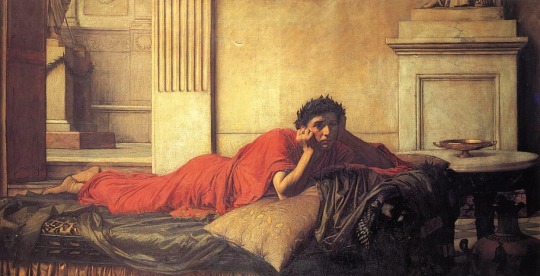
'The Remorse of the Emperor Nero after the Murder of his Mother' by John William Waterhouse, 1878
Part II
108 notes
·
View notes
Text
If anyone is interested in Roman historical fiction, my dad has been writing a series called The Imperial Archives along with two one-shot books on characters met in the series:

What does a teacher do when confronted with a garden full of Praetorian Guards? Claudius Numisius finds out when he accepts a mission from Caesar to search for an unknown people who are reputed to possess a mysterious ability, an ability
Caesar wishes to appropriate for the Empire. How far will Claudius go and what will it ultimately cost him? Orphaned siblings and a psychopath intent on using a weapon of horrific consequences cross the teacher's path and threaten the success of his mission. Whether it is Gaul, Germania, or Sicilia, wherever Claudius goes, it seems that death will follow.

Inexplicable disappearances have plagued a province in the eastern Empire for almost a quarter of a century; occurring at maddeningly regular intervals, but neither a clue nor a reason have ever been found to explain anything. A mysterious and unknown city and a shadowy figure may reveal the motive behind the disappearances, but can Claudius unravel the secret before it threatens the existence of the Empire?

How does a girl find her way in the Empire that she calls home, but one that she does not feel at home in? Julia Scipionia and her family are uprooted and moved across the Empire for a chance at a better life. It seems, however, that a better life was meant for everyone except her. Julia is a troubled young woman until she finds someone who helps her to discover who she really is. The path she takes is not an easy one; along the way, she will endure happiness, heartache, mayhem, and murder.

How does a young woman from Germania become the most powerful leader in the world? Liesel Daunhauer’s path to that title is one that she did not seek; one that takes her from her home in Germania to the Mosel River and the Teutoburg Forest. A path that forces her into close contact with the Seleucids; the ancient enemy of the Empire that will stop at nothing to destroy her and any Imperial citizens that get in their way.
If this is your vibe, consider checking them out :)
#historical fiction#my dad was a history teacher and he clearly knows the history that he wanted to write in#boost plz
46 notes
·
View notes
Text
The Bear, The Bard, and Hamlet
Christopher Storer pulls from so many media types, music, movies, opera, theater, and it's beautiful. He is on point with Alfred Hitchcock in telling stories visually.
Like others have mentioned @gingergofastboatsmojito @thoughtfulchaos773 @currymanganese he pulls from the Bard, William Shakespeare. Fairest Creatures and Midsummers Night's Dream.
Another is Hamlet. Long story short, Hamlet's uncle kills his dad, marries his mom, and he goes, rightfully so, a bit mental with wanting revenge. (Yes, yes, yes, it's far more poetic than that. Worry pas, I get it. My dad is a retired English Lit professor.)
So, how does this relate to The Bear? Well, Mikey is definitely the stand in dad for Carmy and Nat. But, take it a step further. Their dad, seemingly, vanished, left them. Their "uncles," Lee and Jimmy, are connected with unsavory types. *cough *cough the mob. Mikey, Donna, and Jimmy say he wasn't good with the business. This has me wondering if, like with his son's, he went looking for a loan that he either couldn't, didn't, or wouldn't pay back. Not that Jimmy or Lee killed him, but they know what happened to him. And I feel that they also had something to do with Mikey's death. Again, not that they did it, but they know more than they are letting on. Jimmy feels so guilty this season. And felt so guilty to give Mikey the money in the first place. Where is that guilt coming from?
So, back to it. Carmy is Hamlet (Hamlet is driven by revenge. Carmy is driven by a need to prove himself for attention and acceptance. And kinda revenge, too.) Mikey is King Hamlet (king Hamlet is Hamlet's father. Mikey is the stand in dad to the bear siblings). Claudius is Uncle Lee (fucking asshole abusive prick. And I know there's more to Mikey's death and Lee had a part to play.) Donna is Gertude (Hamlet's relationship with his mother was strained and she was also poisoned. Carmy's relationship with Donna is messed up and her drinking also isn't good for her.) Ophelia is Claire (She gets burned by Hamlet. Not literally. Which does happen to Claire. No matter how I might feel about her.) Jimmy is Polonius ( "He is the chief counsellor of the play's ultimate villain". Jimmy is in businesss with Lee. And Polonius is supposed to be a busy body. Which, let's face it, Jimmy is.) Fak and Teddy are Rosencrantz and Guildenstern (I want more space for them lol.)
Let's add the other Shakespeare plays in here, too, so we can get a good idea of the whole complete story of the Bear.
I also love that Richie is Puck. His fucking dream weave, people.
The rest of the Faks are The mechanicals.
Syd is like Cordelia. (King Lear's youngest daughter. Yes, I know, another play but still relevant. She refuses to wax poetically about the love of her father in public just to get some land. He refuses her and makes her life hard... Syd's not signing the agreement and is not really enjoying this version of Carmy.) She's honest, true, and brave. Puts up with a lot of shit.
I'd like to go back to two characters though. Dum and Dummer, Tweedle Dee and Tweedle Dum, Rosencrantz and Guildenstern or Neil and Teddy Fak.
In Hamlet
"They are two old school friends of Hamlet, and they come to visit him after his father's death, though it turns out that they are called to Denmark by King Claudius and Queen Gertrude to spy on Hamlet. They represent corruption and deceit in the play, and their existence and actions are full of irony."
Wait, what was that last part again?
"They represent corruption and deceit in the play, and their existence and actions are full of irony."
Hamlet ends up killing them, lol.
I don't think Carmy will. But it's definitely going to be interesting. Oh, Ophelia goes mad (because of Hamlet) and drowns herself...I don't want that for Claire. Hopefully, she moves on. Clearly they aren't good for each other.
Also, Richie, I want more of your dream weave. Lord, what fools these mortals be, am I right? Come on Robin Goodfellow, show us the goods.
#the bear#shakespeare#the bear season 3#sydcarmy#richie jerimovich#ted fak#neil fak#uncle jimmy#mikey berzatto#carmy berzatto#sydney adamu#claire dunlap
21 notes
·
View notes
Text
Station 11 wrapup!
You all know I'm a stickler when it comes to adaptations. I just reread a whole bunch of books so I could nitpick their adaptations better. But Station 11 said fuck that. This is an adaptation. We're going to adapt.
Station 11 the book is about the power of art. Survival is insufficient! Art brings back joy in the apocalypse. The Prophet is there, yes, mostly as a generic post-apocalyptic predatory cult to move the plot along, and he's defeated after a moment of artistic connection. But the TV show says, hold up. Yes art can save us. It can allow us to speak to each other when we can't find the words. But it's not enough on its own. You can't keep telling the same story for 400 years and always have it land. You have to leave the wheel. You have to adapt. You have to ask yourself, what if it ends differently this time? If you don't - if you resist all change, if you can't handle going off course - you're going to wither and die. Frank unable to leave his house. The father dead on the sofa. Kirsten letting poison spread through her veins. Hamlet, who for four hundred years has been dead from the beginning. The finale music doesn't play at the end of the final episode of Station 11. It plays during the play, because that's the turning point, when this show's Hamlet holds a knife to Claudius's throat and doesn't stick it in. The play finally gets another ending.
It's not subtle about any of this. The metaphors, the narrative parallels, the masterfully done scene cuts, and the select quotes about Station 11 are all very blatant, but it clicks together well enough that it works and I don't care. When we get to the final episode and Miranda drops a tragic backstory that happens to connect to the problem at hand, I accept it because I'm not bought into this story as realism, I'm bought into it as a piece of well-constructed, very deliberate art.
Your art is your message. It's your last phone call. And maybe sometimes that last call saves an airport full of people. Maybe it condemns a plane full of passengers to die. Usually you don't know. Everyone's going to take it a different way. It might save someone. It might damn them. It might not do anything. Miranda starts Station 11 as her life collapses, burns it all down, and starts again, and then the world ends and two very different people find it and adapt it in two very different, disastrous ways. But you have to make it anyway. You have to talk to people even when they're not there. I don't want to live the wrong life and then die.
I love what the show did with Jeevan, turning a relatively minor character into an awkward millennial fumbling his way through the end of the world but genuinely wanting to do good. I loved the extra content we got from Miranda and the ways she touched people's lives even beyond her graphic novel. Clark's dark turn was unexpected but worked for the story. I'm still not sold on why everyone loved Arthur Leander, but I am constitutionally immune to movie stars. I liked that the show took the brief connection between Kirsten and the Prophet and turned it into two very lost people who remember damage and can't escape the stories they're telling themselves until someone else crashes into them and tells it a different way. Forget the generic Christofascist child bride cult. We've heard that before. Let's hear something else.
My one complaint is the child army thing got defused a bit mysteriously, but mostly it was tidy in the way a graphic novel is tidy. Every image is deliberate, every line counts. This is one of the rare instances where I think I actually like the adaptation better than the book, although it's very clear that they're doing different things. I probably should have saved this for last because now all the other TV shows are going to suffer for not being Station 11, but them's the breaks sometimes.
Highly recommend! Only if you can handle pandemic trauma though.
20 notes
·
View notes
Text

Marble bust of Claudius Caesar (10 BC-54 AD), 4th Roman emperor, ca. 41-54 AD
Museo Archeologico Nazionale, Naples, Campania
The Roman conquest of Britain was the Roman Empire's conquest of most of the island of Britain, which was inhabited by the Celtic Britons. It began in earnest in AD 43 under Emperor Claudius, and was largely completed in the southern half of Britain by AD 87, when the Stanegate was established.
-
Slavery was an accepted part of everyday society in the Mediterranean world at the time when Rome made contact with Britain. As the Roman Empire expanded, many slaves were acquired as prisoners of war. Rome's initial contact with Britain, followed by the conquest, continued to supply British slaves onto the Roman Slave Market.
This brutal way of life is reflected in the writings of Strabo (1st century BC - 1st century AD). He referred to slaves among the list of commodities exported from Late Iron Age Britain.
Generally a slave's life expectancy was short. Their usefulness declined as they got older, often beyond the age of 30.
Archaeological finds reflect the shocking trade across Britain and East Anglia. Slave shackles and other objects have been found in Essex, Suffolk and Norfolk. -Norwich Castle Museum, Slaves in Roman Britain.
#claudius#slaves in roman britain#slavery#world history#conquest#western civilization#art#fine art#european art#classical art#europe#european#fine arts#europa#mediterranean#sculpture#roman art#roman#southern europe#britian#british#britannia#britain#brittany#celt#celtic
28 notes
·
View notes
Text
ficlet: inspired by this scene from the show never have i ever
when the rule change is announced, shortly after the hunt for katniss draws a dead end and the two cannons in quick succession of each other combined with the fact that marvel never met up with them announce the very probable fact that he's dead, cato and clove are left facing one another, shocked into stillness by the news. their weapons lie discarded at their sides, gathering dirt and whatever else is lying under the arena's soil to add little dark specks among the blood. the resounding silence echoes around them in a stark contrast from claudius templesmith's booming voice that had swept the arena just seconds before.
clove recovers first - out of the two of them, she'd always considered herself the faster one - and shrinks back into a persona she's comfortable with, her default shell of biting sarcasm and scathing sharp wit wrapping around her comfortably like a blanket to a newborn. "so it looks like we're the only two left," she mutters slowly, more to herself than for cato's benefit. "and we're in the finals, apparently." cato grunts in confirmation.
"it's awesome that you made it this far," he says slowly, and she can visibly see him regaining his wits in real time, the transformation obvious in the unsubtle changes of his facial expressions - unlike her, he had no practice in carefully controlling and mastering what he allowed his face to reveal. clove observes his recovery and takes note of his surprise, which is followed by slow acceptance, and then followed by the dawning of a reality she'd accepted several seconds before him.
naturally, his irritating habit of finding every opportunity to provoke her returns with his recovered senses. it doesn't take long for him to become his typically insufferable self. gathering his weapons and approaching her with the cocky smirk she'd come to associate him with, cato continues his jab. "we'll see how it goes, clover." his large hand settles companionably on her shoulder in a friendly gesture clove decides not to punish. she also doesn't bother to protest at the term of endearment - better cato, anyways, who says it with some modicum of grudging respect and admiration, then marvel (an ally she did not at all "dearly miss") who liked to relentlessly tease her and imply that there was something going on between her and her district partner that existed under the surface of their mutual antagonism and vicious barbed-wire threats.
clove watches him walk away, probably back towards their campsite (because of course he just assumes she'll blindly follow along like he's still the leader of a pack that's mostly dead - or close to it, in peeta's case), incredulously. "what the fuck do you mean by - cato, i'm telling you 'how it'll go' right now!" in a rare moment of weakness that she isn't proud of, she hastily stumbles after him so they can walk side by side as she gets the last word. normally, clove prides herself in not putting that much effort to win a verbal battle against someone, always ready with a cutting remark, but this time he's gotten the better of her.
cato's amused chuckles only agitate her further. "it'll go bad for you! and good for me! because i'm the better tribute and we both know it, you blonde oaf!"
he comes to a stop beside her to laugh, almost hysterically. and clove can't blame him, she can only blame herself for her lame attempt to sass him.
but because she was never one for self awareness, she blames everything but her own behavior. so many factors were responsible. the stupid rule change that meant they were inextricably tied to one another, cato for making it difficult for her to contemplate a reality without his hubris and deep chuckles and strength complementing her own as they fought side by side. cato for being her only tie to home and weakening her so badly she'd begun to consider him a friend. a friend, of all things, when he was supposed to be just some competitive asshole with an ego she could easily check with a well aimed blade at a lethal area.
because he felt the need to worsen her current feeling of indignity, cato smiles down at her - fondly, with crinkling and affectionate eyes as if he has grown to enjoy her presence. like an insane person. "fine, but we can go home together now, you know."
"stop that. we're still enemies. it doesnt change anything, and you know it." she feels the need to regain distance, and fast. hide whatever is the reason for this weird sense of gratitude that claudius templesmith's announcement had drawn out of clove.
"yeah, no shit, i can't stand you," he agrees, although clove doubts his sincerity based on the impish smile he's not working too hard to cover. cato watches her glaring back at him with his arms crossed in an obvious attempt to flex, leaning casually against a tree like he's some unreasonably handsome capitol model endorsing a weird makeup product, as always too confident and assured in his sense of righteousness.
it's a fight she has no chance of winning. with a huff, clove opts to ignore him, resuming the trek to their campsite and keeping him at her back where she doesn't have to deal with visual evidence of his presence.
he laughs lightly behind her, obviously amused by her failure to one-up him. her lips twitch upwards responsively in an exasperated smile that she forcibly suppresses.
#mineheadcanon#minefic#thg#thg fanfiction#clato#clato fanfiction#the hunger games#cato x clove#thg cato#thg clove#clove thg#cato thg#district 2#cato hadley#clove kentwell#dyn: cato & clove
19 notes
·
View notes
Text
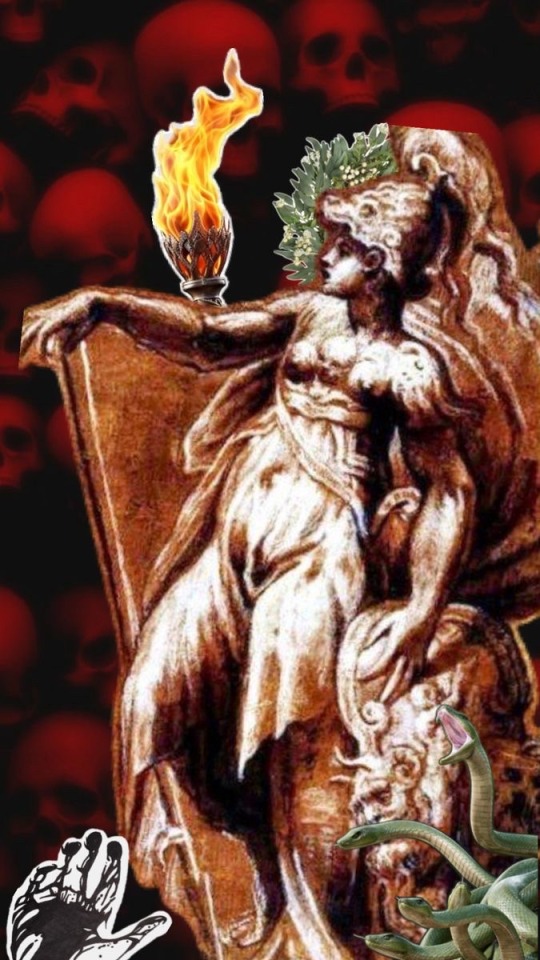
Roman Goddess Bellona of Warfare and Bloodlust
Attributes:
Warfare
Valor
Bloodlust
Madness in Battle (Frenzy)
Destruction
Devastation
Diplomacy
Symbols:
Torch
Whip
Bloodied Hands
Snakes/Serpants
Sword/Spear (Javelin)
Helmet
Shield
Blood
Festivals:
She was celebrated on June 3rd by her priests called Bellonarii to prepare blood sacrifices they would wound their arms and legs. On March 24th, the Days of Blood is performed (dies sanguines) which were pretty violent way of worship of the goddess which is explicit but all I say it involves flogging hence the whip symbolism. I am not going to go into detail I don’t even know that’s allowed but if you are curious please do take the time of research the rites for historical context. But please for all that is holy PLEASE DO NOT RENACT THESE RITES ITS VERY DANGEROUS AND OUTRIGHT EXTREMELY HORRIBLE if you are sensitive to self harming or blood then please do be careful when researching this topic. If you wish to worship Bellona THERE ARE OTHER ACCEPTABLE WAYS OF WORSHIPPING HER WITHOUT HARMING YOURSELF. I just needed to address that this post is just for education purposes.
General Information
Lady Bellona was the Roman goddess of Warfare and bloodlust. Indigenous to Italic tribes of Italian pennisula, she is said to be linked with the ancient Sabine Goddess Neiro (War goddess of Valor). Her name is derived from Duellum (War, Warfare) but also Bellum (Valor in war).
Her temple was established in Rome around 296 BCE during the war with Etruscans and Samnites by Appius Claudius. They hung shields on walls in the temple dedicated to the goddess. The temple was a place where foreign ambassadors would go for safe keeping, victorious generals to meet the seneators after a successful campaign.
To declare war on an enemy, the respected priest of diplomacy would throw a Javelin onto the opponent’s land as a declaration of open war. She had shrines and temples was worshipped throughout the Roman Empire however due to her violent nature she was not often worshipped openly or often. It is said that she is the Sister-Wife to Mars, she is identified with the war goddess Enyo. She went to war with Discordia, Furies, and Stife to put terror within her enemies.
#hellenic polytheism#paganism#witchcraft#hellenic pagan#hellenic worship#helpol#italian traditions#italian folk magic#roman polytheism#roman goddess
16 notes
·
View notes
Text
Every District “facts” and “local info” according to Festus Creed and old Professor Dementia Demigloss in my TBOSAS on Crack!AU.
[Read this for context]
District 1
Provides the Capitol chocolate coins!
Luxury items Fake gold.
Fashionista Land.
Their mayor is a ✨diva✨ who lives in a gold encrusted treehouse.
District 2
Provides the Capitol hugs and cuddles!
Masonry Mason jars??
Throws bread to their dead.
Their mayor (Mr. Rocky Rock O’Rolly) is a piece of rock. #immortalmayor2me&u
District 3
Provides the Capitol “free” flat screen televisions and spy cam teddy bears.
Technology Techno Pop Robo Cop??
They can hack your ass.
Their mayor has a flying wheelchair.
District 4
Provides the Capitol sea witches and lobster guards.
Fishing Catfishing. Duh.
They don’t serve bacon pizzas in D4. They might not even know what a pizza is (according to their local gremlin).
Their mayor is a self proclaimed mermaid.
District 5
Provides the Capitol the strongest Hello Kitty duct tape in the world.
Electricity Power Rangers!
Clemmie’s daddy is the shadow king of D5.
Their mayor is a homeless electrician.
District 6
Provides the Capitol Thomas & Friends.
Transportation Transformers??
Nero Price used to be the shadow king of D6, but now he’s a werewolf.😔
Their mayor only cares about her exclusive toy train collection.
District 7
Provides the Capitol wooden chairs and “free” firewood.
Lumber Cucumber??
They can throw and swing their axes taxes!
Their hobo mayor is a self proclaimed “flower child” who can talk to trees and bees.
District 8
Provides the Capitol sparkly mini skirts and sexy lingeries??
Textiles Project Runway.
Apple berry pies and cookies are their only “accepted” currency.
Their weird mayor claims to have a walking and talking bathroom rug. She might be crazy (but not “Palmyra Monty” crazy).
District 9
Provides the Capitol grain rain??
Grain Raisins.
They might have a secret “rice worshiping cult” over there. Who knows. Don’t care.
Their mayor sells a suspicious smelling “sugar powder” for a living. Is that even legal? Somebody should investigate him.
District 10
Provides the Capitol blue cheese and ✨Moo Moo Milk✨.
Livestock Chicken wings and drumsticks.
Domitia’s himbo daddy rules D10 with his emotional support cow (Lord Claudius).
Their mayor is Lord Claudius.🐮
District 11
Provides the Capitol cabbages and lima beans.
Agriculture Cabbage land and vultures!
They can legally marry their scarecrows. However, they are not allowed to divorce their scarecrow spouses for some reason.
Their mayor’s wife is a sexy scarecrow.
District 12
Provides the Capitol singing birds and pole dancers??
Coal mining ✨Pole dancing✨.
They’re poor but they don’t live in dumpsters with their freaky pet rats.
Their mayor’s daughter is a mean boyfriend stealing b*tch (according to their local singing rainbow bird).
District 13
The Capitol Nobles are currently pretending that D13 doesn’t exist anymore. But we all know it does. Lol.
D13 is now called the underground “Mole Kingdom” ruled by the mole people.
President Ravinstill is highly allergic to mole people and their rebellious mole habits.
Their self proclaimed “mole president” is deathly allergic to Bichon Frisé puppies. But who cares! D13 doesn’t exist.😉
#tbosas#crack post#crack ship#snowjanus#snowplinth#coriolanus snow#sejanus plinth#lucy gray baird#festus creed#district 4#district 12#katniss everdeen#peeta mellark#the ballad of songbirds and snakes#ballad of songbirds and snakes#president snow#hunger games#the hunger games#thg#suzanne collins#alternative universe#thg fic#thg incorrect quotes#tbosas fic#tbosas incorrect quotes#thg fanfiction#thg series#crack treated seriously#crack fic#coriolanus x sejanus
47 notes
·
View notes
Text
The Conflicts of Disney's Hercules (Part 3): Hades vs Zeus
Brother vs brother- talk about a tale as old as time, huh? From Cain and Abel to Hamlet and Claudius to the more modern examples of Mufasa and Scar to Thor and Loki, what's not to hate about about two brothers at odds with one another? Well technically its more of an angsty, brooding guy who's had it up to here with their perfect golden retriever brother getting the throne, daddy's attention, and/or the girl. While our bootiful no-thoughts head empty golden child becomes intimately aware at the last possible second of their brother's treachery as they're falling into your proverbial wildebeest stampede.
That's right y'all.
May I present to the surprise of no one.
THEM:

Finally we come to the conflict that sent the proverbial Sisyphean boulder into motion that is Disney's Hercules.
Part I: And now a word from our IV pound sponsor:
Before I begin my analysis on the relationship between Disney's Hades and Zeus, I thought I would provide a bit of background to the established canon Disney presents us. Mind you, dear reader, we have the 1997 film and the Hercules animated TV show (1998) to look towards. However, there are minor conflicting information between the two, but as always, the movie is always more canon than what the TV show gave us.
Zeus is older, Hades is younger. Weird I know.
But I'm gonna go out on a limb here and support Disney on this one. Because while in the grand scheme of things Hades is most definitely NOT the youngest child of the siblings in Greek Myth, there is a small technicality that cements Zeus' authority to rule over his older siblings as if Zeus was the firstborn child this whole time.
That technicality being: Kronos

Kronos gets the big bag prophecy/curse from Gaia that one of his children will overthrow him like he did with his dad, so Kronos starts baking his cake and eating it too.
Hades was the first male born (hestia is traditionally firstborn but patriarchy or whatevs) so that also made him the first to be swallowed by Kronos. Thus, when Zeus freed the rest of his siblings, Hades was the last son to be up-chucked since he was ingested first - that made Hades the last "born."
And this "second birth" of Poseidon, Hera, Demeter, Hades, and Hestia is what cements the order of authority in the 6 siblings hierarchy. Therefore, Zeus was made firstborn and had full authority to claim the sky if he so desired.
But Zeus was a chad in those days and still gave his brothers a chance to draw lots and all that b/c even he saw how unfair the Fates had been to his brothers. Yet still, destiny favored Zeus and Mr. High and Mighty got the kingdom with a view.
Which is a perfect segway to the next set of rules I'm working with here:
2. Zeus is a good guy.

Okay, I know it hurts to accept this, buttercups, but we have to muscle through it. The version of Zeus that we got in Disney's Hercules is a sanitized, lovable goofball who loves his son, his wife (is that allowed?), and his brother who's going through a phase.
BTW I would like to draw attention to the fact this is the first time in an adaptation of greek myth where Hera is Hercules' bio mother. This is clearly outlining to the audience- hey! Zeus is faithful?
So Zeusy's worst flaw (infidelity, Don Juan, insatiable sexual appetite- pick your poison) has been erased. That's wild, but we have to accept this to better understand the context of Hades vs Zeus. We have to establish who has morality in this equation. Earlier parts of my Hercules Conflicts series had obvious good guys vs Hades, but for this one I have to build it up because of the history of these mythological figures.
However, before I roll into it, I would like to dig on Mr. Thunder Dunder Head once.
This man violated the Geneva Conventions doing this to Danny DeVito:

Talk about some Zeus ex machina- yeesh.
Part II: And Then Along Came Zeus

With the introduction out of the way, now we can talk about the central conflict that kickstarted this movie into gear.

From the get-go, Hades establishes that he doesn't reciprocate his brother's affection. What should've been a good ol' fashioned family reunion turned into a neon flashing sign that Hades is very uncomfy around his brother. Hell, even when Zeus is trying to be friendly he ends up ordering him around.
And I don't think anyone's mentioned this before, but doesn't it seem like Zeus is just as touchy-feely here as Hades is with those beneath them? It makes me wonder if Hades learned this behavior from Zeus.

Now, we also get the idea that Zeus is clueless. Not just to how Hades is purposefully keeping him at arm's length, but also to how the other party guests, the gods, get very quiet and passive aggressive the second Hades showed up to spoil the party.
And you better believe this three-minute scene is the basis for this entire post. And there is a lot to digest here.
First off, we get Hades' motivation, his goals, and the receipts. You better believe this babe is writing in his little black burn book as soon as he gets back in his chariot.

From Zeus, to Hercules, to the rest of the gods, home boy has a lot to update after popping in after a long time. And I hate to be that guy, but a show of hands on who felt more sympathetic for Hades here?

Like I've mentioned in Disney's Most Sympathetic villain post already, but Hades' villain entrance is not intimidating in the slightest. If anything, it quickly establishes that Hades is kind of a loser in these circles.
To recap, while on Mt Olympus for two minutes Hades is:
Manhandled by his older brother
Manhandled by his nephew (ok i get this one, he nearly hurt a baby, those are spikes after all)
Ignored. Nobody but Zeus makes eye contact/or acknowledges him. More than likely this is b/c they can't stand the guy and out of respect for Zeus they've elected to just ignore him and hope he goes away.
Zeus gaslights him - yes, the guy who gave him the underworld job is telling him to slow down and live a little. That's like your boss gives you a crap load of work and comes by to ask you why he never sees you take time off. I will die on this hill that's positively diabolical.
And lastly, Hades gets laughed off the mountain.
Not once in this entire film did Zeus ever check up on Hades after this. Not to apologize, not to make up for lost time, bring up an opportunity for a party you could come to, or perform a wellness check. That would've been so hilarious seeing Zeus pop into the underworld and the entire scene is just Hades shenanigans of trying to cover up evidence of his plot to murder this guy.
Although to be fair, Myth!Zeus had the same issue!
BUT to Myth!Zeus's credit, he made an attempt to improve his brooding brother's mood. And he did it in the worst way possible by immediately fixing him up with Persephone. So you really can't say that Myth!Zeus isn't trying.

Now since I've bashed Zeus I will give him some credit on his first scene. Hades isn't there to stay and chat, he's on a recon mission. And he evades all his brother's attempts at conversation. He cuts bolt boy off, uses humor as a defense mechanism, and he deflects every time Zeus tries to get cozy. Why?
Homeboy found out a new godling was born.

And the way the movie presents Baby Hercules- from Zeus being awkward and kind of scared to hold him- I get the vibes that the writers are making Zeus out to be a first time dad.
Yeah, apparently we're ignoring Athena, Ares, Apollo, Artemis, Bacchus, Hermes, Hephaestus, etc
Wild I know, but there is a purpose to it.
@persephoneflowerpetals made a very interesting blog post about this particular aspect that deserves a look and got me to thinking.
So not to steal their thunder, but Hades showing up to Hercules' Amphidromia (ancient greek family festival where newborn babies are given their name in front of their family & friends on 5th or 7th day of life) was for him to see who his competition was - whether or not Hercules sided with Zeus or not when Hades' own uprising happens.
And by not siding with Zeus, I'm talking about Hercules having his own type of uprising and usurping his father as all the previous kings had done before him.
Which is really cool! It's taking the Lion King/Hamlet story from a different angle. The nephew is just as much of a threat as his father if not more.
You see age doesn't really factor for Greek gods (Artemis was born minutes before her brother and she helped her mom deliver him & the food of the gods aged baby godlings quickly) so it's a very smart move for Hades to see what he was up against very quickly. Hell at this point in time he had no idea he just needed to wait 18 more years for his uprising.

And that's why Hades was more concerned about the sunspot than his own brother. It could very well be that he wouldn't be fighting Zeus, but Hercules for the ownership of the Olympian throne.
This puts Hercules on equal footing with Zeus in terms of level and power and establishes why Herc is the main protagonist- not Zeus.
Hell, if anything, Hades knows from experience that posterity can easily overtake the previous generation. He did that once despite the odds being stacked against him and his siblings even though Gospel Truth claims Zeus stopped the Titans on his own.
Part III: Olympus is That Way

The Titan Jail break will never not be funny to me. We see 5 giant Titans stomping around in the woods, the seas, the fields, cities, etc in what I am assuming is about sunrise?
You mean to tell me there wasn't a single person- or god, we have to remember there are gods in this universe that didn't want to- I don't know- let Zeus know what was coming? I mean it's not like Poseidon would know they were freed from their underwater prison, or Apollo as he's driving his chariot- it is a bit cloudy after all, or any others to notice their cities with mortals actively praying to them are under a massive attack.
Horses were killed, Poseidon. Your descendants. My sibling the horse girl is very disappointed in you.

Now I know this is touched upon in my series Hercules Conflicts Part II, but it does merit a mention since ultimately it is Zeus' fault / laziness that the Titans were able to show up on their front doorstep without anyone realizing until too late.
And Zeus is absolutely torn apart when he realizes it was his brooding baby brother who gave him the ol' Judas Kiss.
I couldn't find the gif of Zeus' realization face that maybe what his brother was going through was not just a phase. However, just like Mufasa before him, bolt boy realizes too late of his brother's treachery.
And what's the last line, Hades delivers to Zeus:

Oh?!
Is- is Hades bitter about the job Zeus gave him? Of being ordered around while the rest of the pantheon got to play around and have some fun?
Jokes aside, but Hades' whole plot, all his animosity and antagonism towards Zeus came because of the lot he was given by bolt boy over here. And while Hades does call Zeus his greatest rival it's because Zeus put him in that position in the first place.
Zeus created his worst enemy.
It's like one of my profs commented once in my classes back in my uni days. The oil spill that happened in the Gulf of Mexico didn't happen because of one mistake. It happened because of several mistakes, several oversights, several safety overrides for the sake of not losing money were made over a period of years that eventually lead to a disaster that no longer could be ignored.
And that is ultimately what became Zeus' fatal flaw in this movie.
His negligence.
We can blame the other gods for not being as committed as well, but it's like Hopper says in bug's life:

Zeus is at fault for his brother's betrayal, his son being turned mortal, and the mess the Titan's left in their wake.
So at the end of the movie when the Muses deliver another absolute banger, the system doesn't change. Things go back to the way they were just minus the one guy at the bottom most rung of the cosmos' ladder.
If change is to happen it starts at the top.
Not to end this on a downer- although we all know how screwed this world is after the credits roll, but I am happy to report, dear reader, that change does happen.
It's small, but it's still resounding.
Hercules chooses not to join his father. Just as Hades predicted in the opening scene if you go along with my theory from earlier in this post in Part II. And this wasn't even with the assistance of prophecy, it was because Hades knew his brother too well.
Zeus has a very exclusive club atop Olympus and he would never let someone like Meg, despite all that she's sacrificed and redeemed herself for. Because Meg is a representation of Hades here. Something I was very vocal about in Part 1 of my Hercules Conflicts Series.
And before you argue, remember, Zeus is the one who told Hercules that only gods can live on Olympus. Bolt boy knew Hercules was about to ask for a freebie for her, but his stance was made very clear on the matter.
So, Hercules refuses. Hades was proven to be correct.
Now, Hades just didn't know why Hercules would defect. And Hercules goes back to being a mortal because of Hades. Because Hades put Meg in the right place at the right time. Sure, it's because of Meg that Hades loses. But Hades got someone to realize Olympus isn't all its cracked up to be.
Through mortality.
The very aspect Hades himself represents as lord of the dead and god of the underworld.
Maybe Hades did win after all.

If you made it this far, thanks for reading!
Till next time, my dear readers
~Angel
#disney#disney hades#disney hercules#disney megara#disney villains#my rambles#greek mythology#greek myth#hercules#zeus#disney zeus#hades#disney persephone#disney movies#hercules 1997
25 notes
·
View notes
Text
Claudius: The fool of the dynasty.
Claudius was born in Lugdunum, Gaul on August 1, 10 BC. On his mother's side, he was the grandson of the legendary Mark Antony and great-nephew of emperor Augustus. His father was the son of the Empress Livia and brother of emperor Tiberius. He also had blood ties with Julius Caesar.
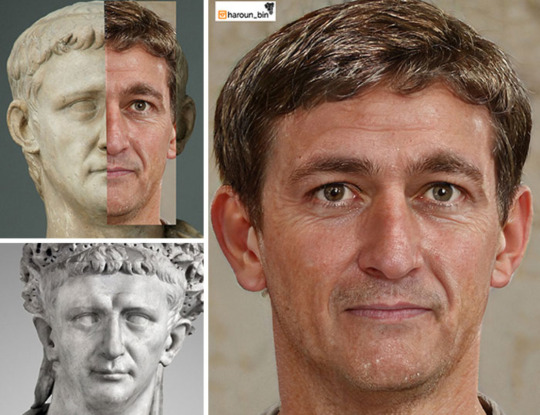
According to historical sources: His sister, Livilla, after hearing an Augur say that her younger brother would be emperor, exclaimed: "May the gods save Rome from such misfortune. That would be the end of the empire." His grandmother, Livia, avoided talking to him because "when he was a child, the empress felt uncomfortable seeing and hearing him." During his childhood, the family avoided taking him to public events so as not to be seen. All this drama just because Claudius was lame, stuttered and had a tic.
During the reigns of Augustus and Tiberius, that is, for almost his entire life, he was prohibited from holding public office because of his "defects." From a very young age it was determined that he could never be heir to the throne. This was determined by his family but not by his destiny.
Three wives, three troubles.


Year 9: The Empress Livia convinced a senator who was a close friend of her family, to marry her daughter, Plautia Urgulanilla, to her 18-year-old grandson. They had a son, Claudius Drusus, who died at 14-15 years old when he threw a piece of pear into the air to catch it in his mouth and the piece got stuck in his throat. Years before the son's death, a girl was born. But months later, Claudius noticed that the baby looked more like one of his freedmen than him. Claudius publicly declared that the girl was not his daughter. This scandal occurred at the same time that her brother-in-law, Plautia's brother, murdered her wife by throwing her out of a window. After this, Claudius immediately divorced.
Year 28: The prefect of the Praetorian Guard, Sejanus, was plotting to occupy the throne. Knowing that no one would accept an emperor who was not related to the dynasty, he married his sister, Elia Paetina, to Claudius. They had a daughter named Antonia. In the year 31 the plots and murders of Sejanus were discovered; Emperor Tiberius sentenced him to death. Claudius was forced to divorce the relative of the traitor but he never abandoned his daughter Antonia.
Year 38: During the reign of his nephew Caligula, Claudius married a woman member of the dynasty. The young and beautiful Valeria Messalina was the granddaughter of Antonia the Elder, Claudius's aunt. Antonia the Elder was the first daughter that Mark Antony had with Augustus's sister. Ten years later, this third marriage will end in worse circumstances than the first two.
Interestingly, "the mad emperor Caligula" was the first of that family to see that nothing prevents Claudius from holding an important position. Claudius at age of 46 was appointed consul.
The less thought day
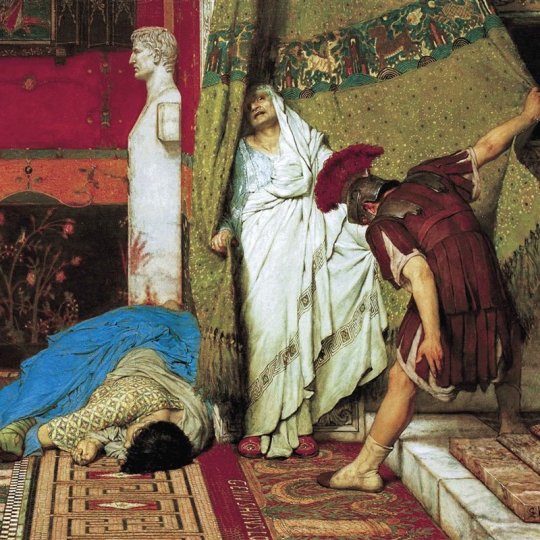
On January 24, 41, the emperor was assassinated by the Praetorian Guard in collusion with several senators. Minutes later, the emperor's wife and daughter were also murdered.
And what no one would have thought possible happened: At the age of 50 Claudius became Caesar. The fourth emperor of Rome.
According to the historians Flavius Josephus and Cassius Dion, Claudius, terrified, thinking that the senators' plan was to exterminate all the members of the imperial family to restore the republic, hid behind a curtain. A Praetorian soldier found him and immediately proclaimed him emperor because he was the only male in the dynasty who could rule, the other remaining member being his 3-year-old grandnephew Lucio Domitius, whom 9 years later Claudio himself would give the famous name Nero.
Claudius the Conquer

Claudius surprised Rome by proving to be not only an intelligent emperor but also a conqueror who would make the empire greater. In 43, Claudius begins the campaign to conquer Britannia. Circa 50 the Romans founded the city Londinium /London.
Although this was his most famous conquest and territorial expansion, it was not the only one. Noricum: Present-day central Austria (west of Vienna), part of Bavaria (Germany), northeastern Slovenia, and part of the Italian Alps. Thrace (Bulgaria), and he made the Danube River a new border of the Roman Empire.
Claudius the Emperor
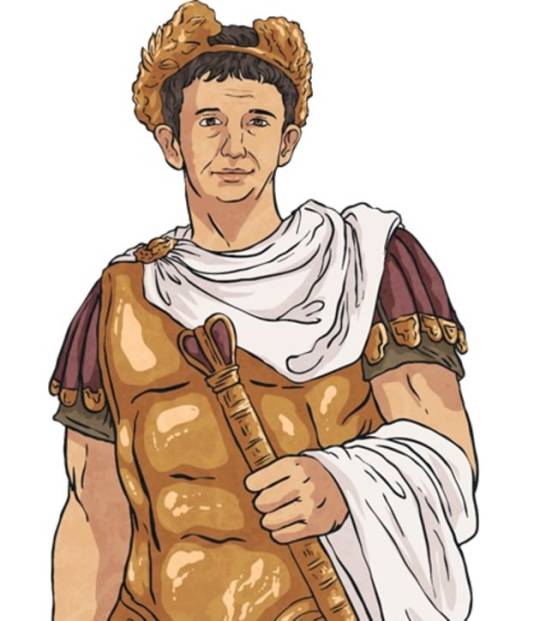
He distinguished himself for his policy of Meritocracy. He rewarded for ability , not for personal sympathies. He allowed men from of non-aristocratic origin access to the Senate. Claudius gained the respect of the Senate, the army and the people at the same time, something that had not been seen in Rome since the time of Augustus.
He had two children with his third wife: Octavia, born late year 39, and Tiberius Claudius, later nicknamed Britanicus due the conquest of Britannia, born 19 days after Claudius' accession to the throne.
He wrote many works, most during the reign of Tiberius. In addition to a history of the reign of Augustus and some treatises on the game of dice, his great passion, among his main works are a History of Etruscan civilization in twenty books, a History of Carthage in eight volumes, and a dictionary of the Etruscan language.
Pliny the Elder refers to Claudius as "One of the best writers". Evidently, Claudius learned a lot from his teacher, the most prestigious Roman historian, Titus Livius (Livy), author of the extraordinary work Ab Urbe Condita.
In the year 47 Claudius celebrated the Ludi Saeculares of the eighth centenary of the founding of Rome.
The tragic end of the empress.
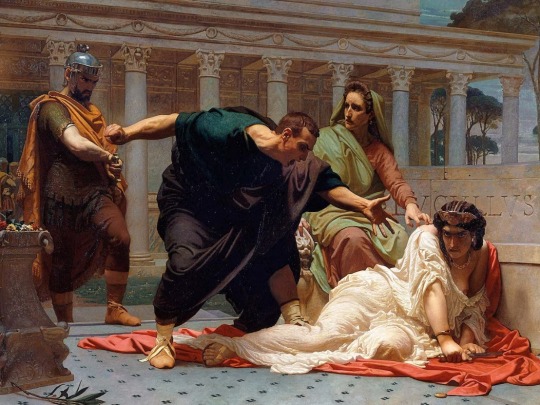
Empress Valeria Messalina becomes the lover of Senator Gaius Silius. Taking advantage of her lineage as a woman of the Julio-Claudian dynasty, she convinced that man that together they could take the throne from Claudius. In 48, while Claudius was in Ostia, Messalina divorced him and married Silius. Three freedmen arrived in Ostia to give the incredible news to the emperor.
According to Tacitus: "Claudius, having returned to the palace, ordered that Messalina be brought to him, but the freedman Narcissus, fearing that the emperor would forgive her, ordered a freedman, a centurion, and some tribunes to proceed with the execution. The woman was overtaken in the gardens and executed; informed of his wife's death while he was at the table, Claudio would not have asked any more questions."
The senator and his group of accomplices and supporters were also executed.
Seven years earlier: Claudius ordered the return of his nieces, daughters of his deceased brother Germanicus:, Livilla and Agrippina the Younger, both exiled by Caligula in 39. Livilla was highly favored by Claudius, and Agrippina the Younger was beloved by the people. This situation caused Messalina worry and jealousy.
Messalina, through intrigue, in a very short time managed to send Livilla back into exile, along with the philosopher Seneca -a close friend and ally of Agrippina the Younger- accusing them of being lovers and conspiring. Livilla died in exile shortly after arriving.
Livilla was just one of the first victims of Messalina's intrigues; The list is very long. The only really bad thing I found in Claudius was allowing himself to be easily manipulated and convinced by Messalina and committing many injustices because of her.
But Mesalina could not make Agrippina the Younger disappear, who was extremely cunning and more dangerous than Livilla because she had a son, that is, a candidate for the throne who, to make matters worse, he had more blue blood than Britannicus. In all likelihood, this could be the reason Messalina attempted to overthrow Claudius.
The fourth wife, and the death.

If Senator Gaius Silius was able to use Messalina's lineage to try to overthrow Claudius by marrying her, what could another do who marries the widow Agrippina, a direct descendant of Divine Augustus? This was the reason for Claudio's incredible decision to marry his niece: simply so that no other man could marry her. Agrippina immediately accepted the proposal to become empress of Rome.
The marriage between an uncle and his niece was considered incest and a crime in Rome. However, this was not an incestuous relationship but a political union. Even so, dispensations had to be presented to the Senate and religious authorities, and there were endless ceremonies.
Finally, in the year 49, in an unprecedented event in Roman history, the Emperor married his own niece. Immediately Agrippina gets Claudius to bring her close friend Seneca from exile, and orders the remains of her exiled sister to be brought to be cremated in an honorable funeral and the urn placed in the mausoleum of Augustus. Agrippina appoints Seneca as her son's tutor and teacher. Claudius granted Agrippina the title of Augusta. Curiously, when Claudius ascended the throne he did not grant that title to his wife Messalina but to his deceased mother Antonia the Younger.
In 50 Claudius adopted his great-nephew Lucius as son and changed his name to Nero Claudius. Agrippina's son become the heir to the throne, instead Emperor's own son. Many historians believe that this was because in the Dynasty, when choosing the successor it was more important to take into account who he was descended from in a direct line. Nero, unlike Britannicus, was a direct descendant of Augustus (great-great-grandson).
Later, Agrippina convinces Claudius to marry his daughter Octavia to Nero. At that time Nero and Octavia are around 14 and 12 years old respectively.
In October 13 of 54, at age 64, the emperor died suddenly during a banquet, after having eaten poisoned mushrooms, according to Juvenal's version.
There are several versions about his death, however they all agree on the theory that the emperor was poisoned. Personally, I want to believe that his death was due to natural causes. The life story of this emperor is extraordinary, it does not deserve such a poor ending.
Below, a text that is not mine but from a very important site with an extensive article on Emperor Claudius. I copy and paste the final part that I was happy to read.

However, as Levick points out, those present at the banquet do not seem to have suspected poisoning of any sort; moreover, the eunuch Halotus, whose job was to taste the Emperor's food, kept his job when Nero assumed the throne—evidence that nobody wanted to put him out of the way, either as an accomplice or as a witness to assassination.
We see no reason to believe that Claudius was murdered. All the features are consistent with sudden death from cerebrovascular disease, which was common in Roman times. Towards the end of 52 AD, at the age of 62, Claudius had a serious illness and spoke of approaching death. Around that time there were changes in his depiction in busts, cameos and coins—with thick neck, narrow shoulders and flat chest. The Apocolocyntosis, addressed to an audience some of whom were present at the death, makes clear that there is no need to postulate poisoning, accidental or otherwise.
Text : © 2002, The Royal Society of Medicine.
The Divine Claudius

Sculpture of Claudius deified (1st Century) Vatican Museums.
After his death, like Augustus, he was deified.
The boy who everyone said could never achieve anything became a great writer, emperor, conqueror and a god.
168 notes
·
View notes